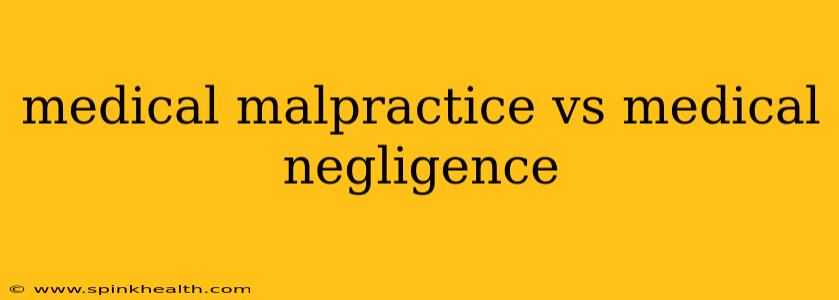The terms "medical malpractice" and "medical negligence" are often used interchangeably, leading to confusion. While closely related, they are distinct legal concepts. Imagine this: Sarah, a seasoned hiker, twisted her ankle on a challenging trail. A doctor misdiagnosed her injury, leading to delayed treatment and long-term complications. Is this medical negligence, malpractice, or both? Let's unravel the intricacies of these terms and explore the nuances that distinguish them.
What is Medical Negligence?
Medical negligence refers to a doctor or other healthcare professional's failure to provide the standard of care reasonably expected of a similarly qualified practitioner in the same circumstances. It's the foundational element of a medical malpractice claim. Think of it as the act of failing to meet the expected standard. In Sarah's case, the doctor's failure to properly diagnose her ankle injury could be considered medical negligence. This negligence isn't necessarily intentional; it could stem from oversight, inexperience, or even a genuine mistake in judgment. But the key is that it falls short of the accepted medical standard.
What is Medical Malpractice?
Medical malpractice, on the other hand, is a legal term encompassing negligence that results in harm to a patient. It's not just about the act of negligence; it's about the consequences of that negligence. To successfully claim medical malpractice, a patient must prove that:
- A duty of care existed: The doctor-patient relationship established a legal duty for the doctor to provide appropriate care.
- The duty was breached: The doctor failed to meet the accepted standard of care.
- The breach caused harm: The doctor's negligence directly resulted in injury, illness, or other damages to the patient. This is often the most challenging element to prove.
- Damages occurred: The patient suffered actual harm as a result of the negligence. This could include physical injuries, emotional distress, lost wages, or increased medical expenses.
In Sarah's situation, if her delayed treatment due to the misdiagnosis resulted in chronic ankle pain, limited mobility, and lost income, this would constitute medical malpractice. The negligence (the misdiagnosis) led to demonstrable harm (the long-term complications).
What's the difference in a nutshell?
The core difference lies in the outcome:
- Negligence: A failure to meet the accepted standard of care.
- Malpractice: Negligence that causes harm or injury.
Negligence is a necessary component of malpractice, but malpractice requires the additional element of demonstrable harm. Not all medical negligence results in malpractice, but all medical malpractice involves medical negligence.
How do I prove medical malpractice?
Proving medical malpractice requires strong evidence. This typically involves:
- Medical records: Thorough documentation of the patient's condition, treatment, and outcomes.
- Expert testimony: Testimony from medical professionals who can attest to the breach of the standard of care and the causal link between the negligence and the patient's harm.
- Witness testimony: Statements from individuals who witnessed relevant events.
The process can be lengthy and complex, requiring the expertise of medical malpractice lawyers.
Is it always easy to prove?
No, proving medical malpractice is far from straightforward. Medical cases often involve complex medical issues, conflicting expert opinions, and intricate legal arguments. Establishing a direct causal link between the alleged negligence and the patient's harm is a crucial and often challenging hurdle. The standard of care can also vary depending on the specialty, location, and specific circumstances of the case.
What if the doctor made a mistake but I wasn't harmed?
If a healthcare professional made a mistake but it didn't cause any harm or injury, it may still be considered medical negligence. However, without resulting harm, it doesn't rise to the level of medical malpractice, and there would be no grounds for a legal claim.
This distinction highlights the importance of understanding the precise definitions of both medical negligence and medical malpractice. It’s a complex area of law, and seeking expert legal advice is crucial for anyone facing a potential medical malpractice claim. This information should not be taken as legal advice, and consulting with a qualified attorney is highly recommended.

